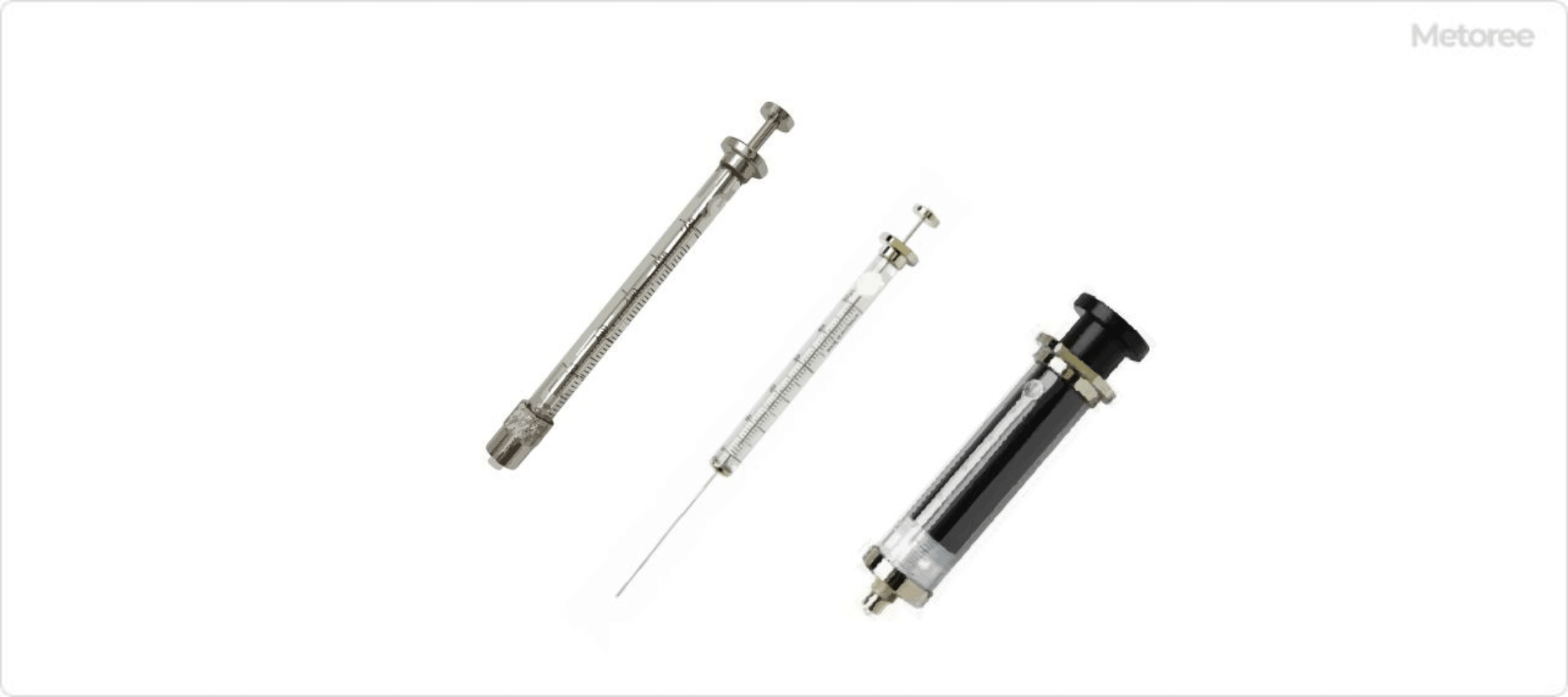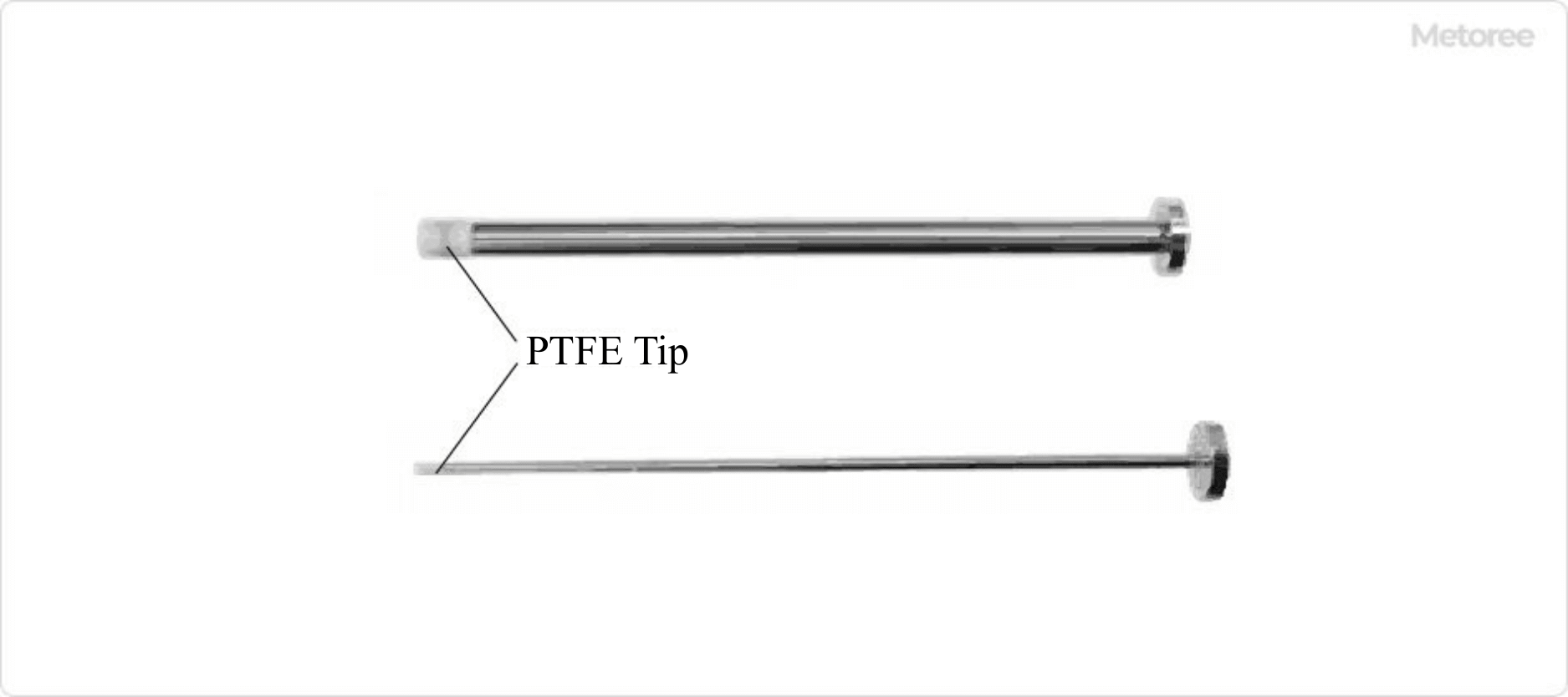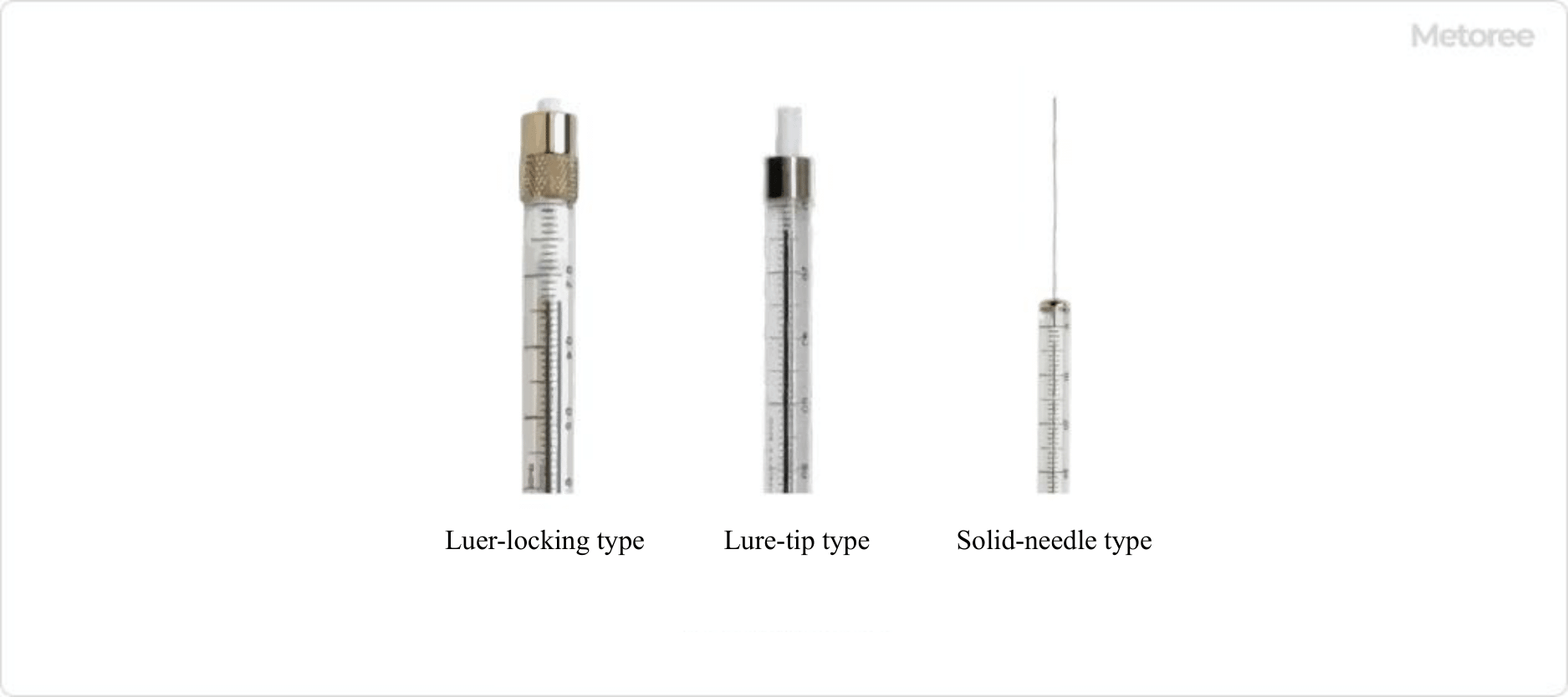All Categories
History








This section provides an overview for gastight syringes as well as their applications and principles. Also, please take a look at the list of 8 gastight syringe manufacturers and their company rankings. Here are the top-ranked gastight syringe companies as of July, 2025: 1.G -Science, 2.GL Sciences Inc, 3.Top Syringe Mfg Co P Ltd.
Table of Contents

Figure 1. Common gastight syringe
A gastight syringe is a hermetically sealed syringe that can handle liquids and gases.
The basic structure of the syringe is the same as that of a general glass syringe for micro-dosing (microsyringe). However, the PTFE tip on the plunger tip improves the airtightness of the syringe. Gastight syringes are usually sold as a set consisting of a syringe (outer cylinder) part and a plunger part.
Most products have the syringe part made of glass, while the plunger part is available in various materials such as glass, metal, and resin lining, depending on the capacity and application. It is necessary to select an appropriate material according to the condition of the sample to be used.
Gastight syringes are widely used for general sample handling in laboratories as well as for quantitative weighing in analysis.
They can handle sample solutions in automatic dilution systems, automated pipetting systems, and manual samplers/autosamplers such as HPLC. The ability to handle gases is also used to handle samples in gas analysis such as GCMS and for soil gas testing.

Figure 2. A plunger on a gastight syringe
The gastight syringes are the same as a normal micro syringe in that they consist of an outer cylinder, a plunger, and a needle.
PTFE (tetrafluoroethylene) is a fluoropolymer and has excellent heat resistance, abrasion resistance, corrosion resistance, and sliding properties.
Precautions for handling include the following:
These are because the gastight syringes are equivalent to glassware for metering.
The types of gastight syringes can be classified in capacity, shape, etc.
Gastight syringes are generally small in volume (a few µL to a few hundred µL), similar to those of ordinary micro syringes. However, some of the larger syringes have a maximum volume of up to 100 mL. The exact volume can be measured and injected.

Figure 3. The shape of the needle attachment part
Gastight syringes are available in two types: the fixed-needle type, where the needle is affixed to the syringe, and the interchangeable-needle type. The fixed needle type is cost-effective and versatile. In contrast, the replaceable needle type is suitable for sampling in instances with significant contamination or where substances like salts tend to precipitate. In addition, needles with different shapes (needle outer diameter/length, needle tip shape) can be used depending on the application.
Interchangeable needles are further classified into the following two types:
Some gastight syringes can be disassembled and autoclaved. This is ideal for handling biological samples in biochemistry and other fields. When autoclaving, it is generally recommended to set the temperature to 110°C for about 20 minutes.
Some manufacturers sell syringes for autosamplers/instruments separately from manual syringes.
As mentioned above, gastight syringes have a PTFE tip attached to the plunger, but there are also products in which the entire plunger is coated with PTFE in addition to the PTFE tip. Such products can be used for corrosive samples. Replacement plungers are also available for various products.
*Including some distributors, etc.
Sort by Features
Sort by Area

PerkinElmer Inc., founded in 1937, is an American manufacturer headquartered in Waltham, Massachusetts, specializing in laboratory technology and management. The company's product offerings include analysis and characterization instruments, software, and consumables. Such offerings cover chromatography, mass spectrometry, molecular and atomic spectroscopy. They also provide immunoassay and food quality analyzers, as well as the simultaneous thermal analyzer (STA). These products find applications in various industries, such as biopharmaceuticals, food safety, lithium battery, and water resource management. PerkinElmer also offers OneSource Laboratory Services, providing knowledge, application, and service solutions for scientific laboratories. Additionally, their LABStartUp program supports new laboratories with instrumentation, consumables, and funding.

Shimadzu Scientific Instruments, established in 1875 in Japan, is a renowned manufacturer and supplier specializing in analytical instruments and testing equipment. The company offers a wide range of products, including chromatographs, spectrophotometers, and material testing machines. Shimadzu's history reflects a devotion to innovation and precision. Catering to industries such as pharmaceuticals, materials science, and environmental analysis, their products enable accurate research and quality control. Shimadzu's extraordinary products, such as liquid chromatographs used in pharmaceutical analysis and universal testing machines for evaluating material strength, empower scientific exploration and quality assurance across diverse sectors.

Hamilton Company is a US-based manufacturer of automation and laboratory equipment including process sensors, precision measuring devices, automated liquid handling workstations, and sample management systems. Hamilton's automation solutions include flexible automated liquid handling platforms and pre-configured Assay Ready workstations that are designed for specialized methods. They also offer small liquid handling devices for temperature control, plate sealing to protect microplate-based samples during critical stop points, and barcode reading. The company is also a supplier of laboratory products such as syringes and needles.

GL Sciences Inc., established in 1968 and located in Tokyo, Japan, is a manufacturer of gas/liquid chromatography equipment, pretreatment equipment, and more. The company produces liquid chromatography/mass spectrometry columns as well as gas chromatography/mass spectrometry capillary columns. It also manufactures gas chromatography packed columns and absorbents, disposable filters, tubing products, bioproducts, and cells. Its products are used for petrochemistry, drugs, medicine, semiconductors, cosmetics in the field of industry, water pollution, residual pesticides, and environment.

Chemglass Life Sciences LLC, founded in Vineland, New Jersey, in 1946 is a manufacturer of OEM glassware, bioprocess cleanroom assembly, and custom metal and plastic. The company's product portfolio includes Custom Single-Use Bioprocess Containers, Chemistry Glassware, Cell and Tissue Culture Glassware, Sample and Chromatography Vials and Closures, and Reaction Vials. Their products are used in industries such as Food and Beverage, Pharmaceutical and Biotechnology Chemical and Petrochemical, biopharmaceutical, and healthcare. The company provides services such as Product Selection Guidance, Engineering Support, and Custom Manufacturing.

GL Sciences is a Japanese manufacturer of gas and liquid chromatography equipment that was established in Shinjuku, Japan in 1968. The company produces liquid and gas chromatographs, columns for separating compounds, fillers for making up stationary phases in columns, and consumables. It also offers gas and air sampling equipment, HPLC instruments, and helium leak detectors. The company’s products are used primarily in the life sciences, environmental sustainability, food processing, and mining industries.


Ranking as of July 2025
Derivation Method| Rank | Company | Click Share |
|---|---|---|
| 1 | G -Science |
30.0%
|
| 2 | GL Sciences Inc |
25.0%
|
| 3 | Top Syringe Mfg Co P Ltd |
20.0%
|
| 4 | Trajan Scientific and Medical |
10.0%
|
| 5 | Shimadzu Scientific Instruments |
5.0%
|
| 6 | Chemglass Life Sciences LLC |
5.0%
|
| 7 | PerkinElmer Inc. |
5.0%
|
Derivation Method
The ranking is calculated based on the click share within the gastight syringe page as of July 2025. Click share is defined as the total number of clicks for all companies during the period divided by the number of clicks for each company.Number of Employees
Newly Established Company
Company with a History
*Including some distributors, etc.
*Including some distributors, etc.
| Country | Number of Companies | Share (%) |
|---|---|---|
 United States of America
United States of America
|
3 | 60.0% |
 Japan
Japan
|
1 | 20.0% |
 Australia
Australia
|
1 | 20.0% |
27 products found
27 products
Trajan Scientific Japan Co., Ltd.
300+ people viewing
Last viewed: 1 hour ago
■Durability due to advanced glass surface processing technology Thanks to innovative technology improvements, the smoothness of the glass surface i...
Trajan Scientific Japan Co., Ltd.
280+ people viewing
Last viewed: 1 day ago
■Durability due to advanced glass surface processing technology Thanks to innovative technology improvements, the smoothness of the glass surface i...
Trajan Scientific Japan Co., Ltd.
230+ people viewing
Last viewed: 1 day ago
■Guide plunger syringe (GP) The diameter of the plunger inside the barrel is thick and prevents the plunger from bending. ■Durability due to advan...
Yagyu Shokai Co., Ltd.
300+ people viewing
Last viewed: 4 hours ago
- A side-hole needle for piercing thick septum, thin plastic, vinyl, etc. ・If clogging is a problem, you can use a horizontal hole needle to pull ...
Yagyu Shokai Co., Ltd.
300+ people viewing
Last viewed: 2 hours ago
- Comes with a PTFE plunger tip, so it can be used for both liquids and gases. -The scale is brown and easy to read.
Yagyu Shokai Co., Ltd.
280+ people viewing
Last viewed: 2 hours ago
・A needle that is easy to penetrate without destroying the septum. - Easy to read because the scale is brown.
Yagyu Shokai Co., Ltd.
350+ people viewing
Last viewed: 1 day ago
・Special needle for HPLC sample injector (Rheodyne Barco) is used. - Easy to read because the scale is brown.
Yagyu Shokai Co., Ltd.
300+ people viewing
Last viewed: 3 hours ago
・PTFE coated needle for thin layer chromatography (TLC). ・The coating reduces the surface tension between the needle and the liquid, making it su...
Yagyu Shokai Co., Ltd.
260+ people viewing
Last viewed: 1 hour ago
The needle can be easily attached and detached, making it suitable for experiments that require frequent needle replacement. *Needles are not incl...
Yagyu Shokai Co., Ltd.
310+ people viewing
Last viewed: 2 hours ago
Syringe for Agilent 7673 autosampler.
Yagyu Shokai Co., Ltd.
290+ people viewing
Last viewed: 2 hours ago
This needle has no dead volume because the plunger reaches all the way to the tip of the needle and pushes out all of the reagent.
Yagyu Shokai Co., Ltd.
280+ people viewing
Last viewed: 1 day ago
It has a handle that also protects the plunger, so the plunger This reduces the risk of the jar bending.
Yagyu Shokai Co., Ltd.
130+ people viewing
Last viewed: 1 day ago
■Features When attached to a push can, standard gas can be taken out with a syringe.
Yagyu Shokai Co., Ltd.
290+ people viewing
Last viewed: 1 hour ago
Syringe for SHIMADZUAOC14/17/20 autosampler.
Takasago Electric Industry
210+ people viewing
Last viewed: 1 day ago
◼︎Features ・Theoretical resolution is 10.5 nL at full step. High resolution and smooth liquid transfer. ・The smallest model has an innovative siz...
G -Science
170+ people viewing
■Product overview The 1000 series syringe has a PTFE coated plunger body and a PTFE tip attached to the tip of the plunger, making it highly airtig...
G -Science
160+ people viewing
Last viewed: 1 minute ago
The 700 series micro syringe is recognized for its high performance in laboratories around the world and is used as a standard syringe product.
G -Science
190+ people viewing
Last viewed: 14 hours ago
The 1700 series syringe is equipped with a PTFE tip and is highly airtight and can be used for liquids, gases, and corrosive samples. The plunger b...
G -Science
170+ people viewing
Last viewed: 1 day ago
■Product overview A gas tight syringe that can be used for both liquid and gas samples. The inner surface of the glass is polished to a mirror surf...
G -Science
190+ people viewing
Last viewed: 5 hours ago
■Product overview The 1000 series syringe has a PTFE coated plunger body and a PTFE tip attached to the tip of the plunger, making it highly airtig...
Kokugo Co., Ltd.
340+ people viewing
Last viewed: 22 hours ago
All plastics disposable syringe 3ml 200 pieces ■Features Made of PP (polypropylene) with excellent chemical and heat resistance.
Trajan Scientific Japan Co., Ltd.
200+ people viewing
■SuperfleXTM flexible plunger Titanium-nickel alloy plunger has excellent flexibility. ■Durability due to advanced glass surface processing techno...
Trajan Scientific Japan Co., Ltd.
180+ people viewing
■Guide plunger syringe (GP) The diameter of the plunger inside the barrel is thick and prevents the plunger from bending. ■Durability due to advan...
Trajan Scientific Japan Co., Ltd.
200+ people viewing
■Guide plunger syringe (GP) The diameter of the plunger inside the barrel is thick and prevents the plunger from bending. ■Durability due to advan...
Trajan Scientific Japan Co., Ltd.
220+ people viewing
Last viewed: 1 hour ago
■Guide plunger syringe (GP) The diameter of the plunger inside the barrel is thick and prevents the plunger from bending. ■Durability due to advan...
Trajan Scientific Japan Co., Ltd.
170+ people viewing
Last viewed: 8 hours ago
Highly precise and accurate, SGE's nanovolume (plunger-in-needle) syringes are ideal for nanovolume capillary chromatography injections and the pre...
Trajan Scientific Japan Co., Ltd.
170+ people viewing
Last viewed: 4 hours ago
Highly precise and accurate, SGE's nanovolume (plunger-in-needle) syringes are ideal for nanovolume capillary chromatography injections and the pre...